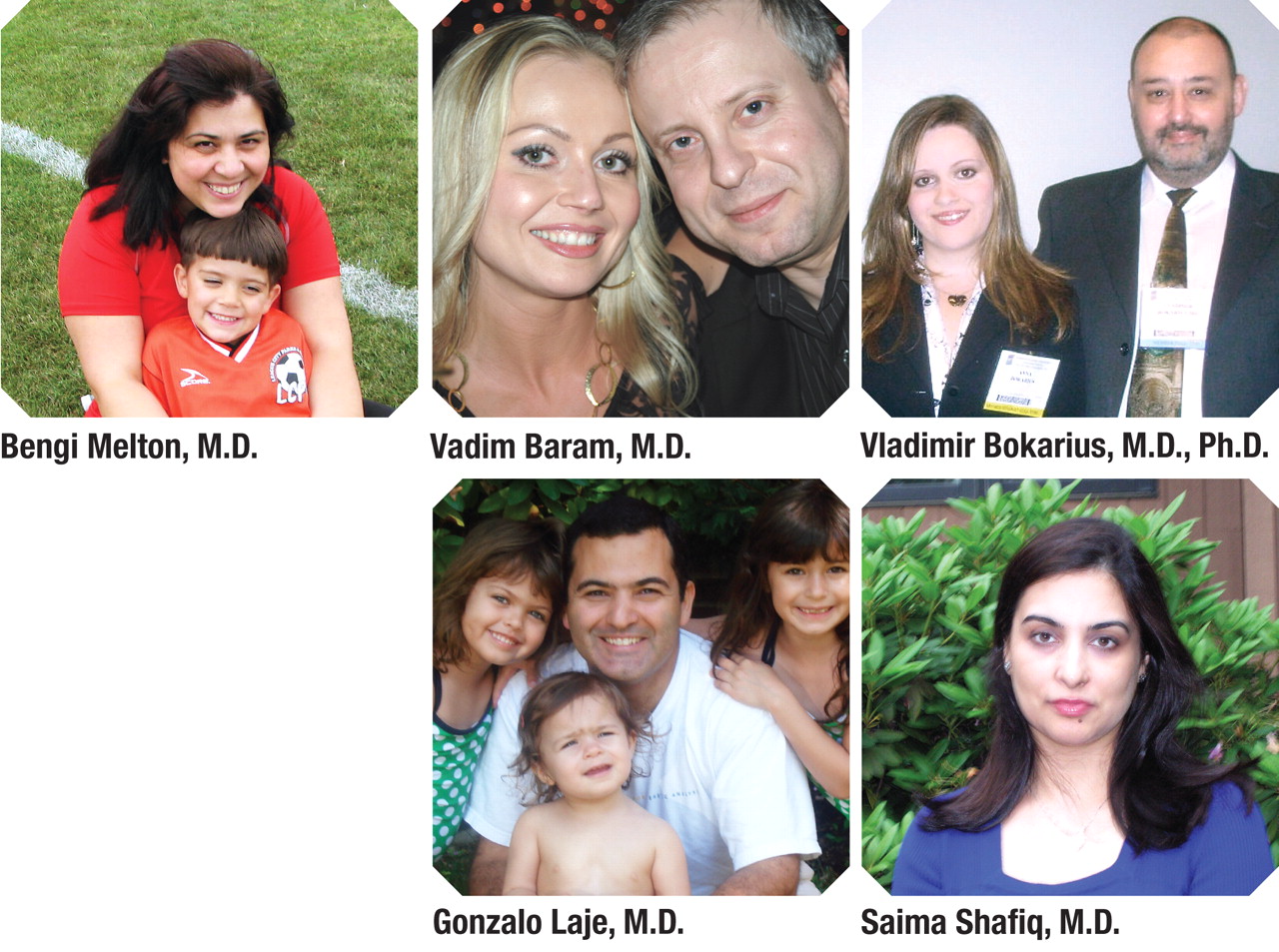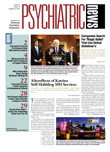In 1993, Bengi Melton, M.D., a Turkish psychiatrist, had an adventure that changed her life dramatically. She was backpacking in Europe and while in Greece met by happenstance a fourth-generation Texan touring the world. A romance sprang up. They decided to marry. In 1997, Melton moved to Houston and eventually joined the ranks of the many American psychiatrists who hail from other countries.
Not all psychiatrists practicing in the United States who come from other countries make the leap from Turkey to Texas or come because of romance, of course. But no matter where they come from or why, they too have intriguing stories to tell. So Psychiatric News decided to focus on the stories of Melton and four other psychiatrists who immigrated to the United States within the past 10 to 15 years. The other four are Vadim Baram, M.D., a St. Louis psychiatrist who emigrated from Ukraine to the United States in 1995; Vladimir Bokarius, M.D., Ph.D., a Los Angeles psychiatrist who emigrated from Russia in 2001; Gonzalo Laje, M.D., a Maryland psychiatrist who emigrated from Argentina in 1999; and Saima Shafiq, M.D., a New Jersey psychiatrist who emigrated from Pakistan in 1994.
Although each of these psychiatrists' stories is unique, some common threads run through them, notably a steely determination to succeed in spite of numerous obstacles.
Master Plan Laid Out
Before Baram left Ukraine, he had a master plan not only to do a psychiatry residency in the United States, but also to establish himself professionally here after residency. “I put a lot of effort into it,” he said.“ It took about four years for me to get through all the certification exams and to find a residency program.”
Shafiq came to this country with her husband, also a physician from Pakistan. “We came over after medical school to finish our specialization in different fields. I chose psychiatry for a number of reasons. I was always interested in it. The residency has reasonable working hours, and I had two small children at the time. And of course the job market is very good.”
Laje was training in psychiatry in Argentina when he seriously began considering coming to the United States. “My interest was in clinical research. At that time I was working on anxiety disorders, and I got in touch with an American psychiatrist, Michael Lebowitz, and he was kind enough to invite me to spend some time with him at his Columbia University anxiety clinic. Initially my idea was not to come to the U.S. to stay; it was to go back and set up some clinical research in Argentina. But I really liked it here and decided that I wanted to stay.”
Challenges and Then Some
However, simply liking the United States was not enough for a foreign-born, newly minted physician, such as Shafiq, to adapt easily to this country or to transform established physicians from other countries, such as Bokarius, into“ American” psychiatrists. They had to overcome daunting hurdles beyond those faced by American medical graduates who desire to become psychiatrists.
There was cultural shock, for example. “When you come from a country like Pakistan, which is basically third world, and psychiatry and medical care are not as good as in the United States, you face certain handicaps,” Shafiq said.
There was language. When Baram came to the United States, he said, “I was able to read English, but in regard to English comprehension and talking, it was a challenge.”
Laje found that the language unique to psychiatric intervention had to be honed. “Although I had a pretty good English background, the subtleties of the language in psychotherapy sometimes got in the way,” he recalled.“ The vocabulary, the way people said things, what they meant with the use of certain words—that took an extra layer of thinking.”
As for the U.S. Medical Licensing Examinations that graduates of foreign medical schools, as well as graduates of U.S. medical schools, have to take to be accepted into a psychiatry residency program, Laje did not have any problem with them, but he knows many medical graduates from other countries who have.
“The exams in general do not ask strange, obscure questions,” he said. “They are very reasonable. The issue for a foreigner is to read them fast and to be able to answer the questions within the allotted time frame.”
An obstacle for Melton, who was already an established psychiatrist in Turkey, was the need to repeat a psychiatry residency in the United States if she wished to practice here. This meant once again reading basic science, going through the routine of being an intern, and taking call, as well as working with classmates who were fresh out of medical school and a little younger than she was. “But I did it,” she said. “I did what I had to do.”
To work as a specialist in the United States, Bokarius also had to do a residency here. But he thought, “Why should I do a neurology residency again? I want to broaden my horizons. What would make me a better pain specialist?” Psychiatry, he decided, would be a good addition.“ And I'm so glad that I did it, not just because I broadened my horizons, but because I got a beautiful new specialty.”
Career Challenges Tackled
Yet even after they became licensed or board-certified U.S. psychiatrists, Baram, Bokarius, Laje, Melton, and Shafiq encountered new obstacles (see
Collegial Advice Offered).
Some were similar to those facing U.S.-born early-career psychiatrists.
Baram was eager to establish a private practice, but found that a psychiatry residency had done little to prepare him for the business aspects of such a venture.
“It seems like all psychiatrists should know research, right?” Laje asked. “But the reality is that it is a sort of specialty. You have to learn the language; you have to learn statistics, methodology. It's a steep learning curve. [Also] my particular research area is genetics. I had to learn genetics. So this was an extra layer of things to learn postresidency and to integrate with my clinical experience.”
“I always wanted to combine some research, teaching, and practice,” Bokarius reported. “But it's difficult. I don't think it's difficult just in the United States; I think it would be difficult in any country.”
Still other challenges they faced, and are still facing, derive from being foreign born.
“Currently there is a war going on in Pakistan, and most of my patients are very interested in knowing where I'm from and what is happening in Pakistan,” said Shafiq. “So it's difficult maintaining a boundary. I do answer their questions. But I try to be brief and come back to the reason why they are in my office.”
Professional Interests Diverse
Even with all the career challenges they are facing, Baram, Bokarius, Laje, Melton, and Shafiq are engaging in an array of professional activities and thriving in their chosen subspecialties (See
International Medical Graduates Make Widespread Contributions). Shafiq works as an adult and child psychiatrist at a community hospital in Denville, N.J. Melton is an assistant professor of psychiatry at Baylor College of Medicine and a staff psychiatrist at the Veterans Administration Hospital in Houston. Baram has a private geriatric psychiatry practice in St. Louis, is doing a little teaching at St. Louis University, and occasionally sees patients in a community clinic. Laje is an adult and child psychiatrist and an associate clinical investigator at the National Institute of Mental Health (NIMH). Bokarius is an attending psychiatrist at Cedars-Sinai Medical Center, a private Los Angeles hospital; medical director of a small corporation involved in consultation services in psychiatry and pain; and a licensed acupuncturist. He learned acupuncture in Russia and uses it to treat pain patients.
Many Rewards Reported
Baram, Bokarius, Laje, Melton, and Shafiq are reaping rich satisfaction from their work.
“I work at least 80 hours a week,” Baram reported. “I am running a big practice with the help of a friend.... There is plenty of work in the field of geriatric psychiatry.... I hope to get some other psychiatrists to join my practice.”
Also, since Baram is the only Russian-speaking psychiatrist in St. Louis, he treats numerous Russian-speaking patients and finds such work especially gratifying, he said.
“I love psychiatry!” Shafiq exclaimed. “It is emotionally draining, but it gives you satisfaction in seeing your patients get better, get back into the workforce, be more productive.”
“My mentor at NIMH is phenomenal. We have some results, and we have a couple of patents. It has been extremely rewarding for me to do these cool, state-of-the-art things,” commented Laje.
“In addition to the more tangible rewards that I receive from my work, one is to practice more Westernized psychiatry,” Melton remarked.“ [Also,] being from a different culture helps me understand patients from other cultures. In Texas, we have a huge Hispanic population and large African-American and Asian ones.... And I feel that I'm finally back to where I started, back home in academic psychiatry—to teach and continue to learn. This is what I really enjoy.”
So, just as countless immigrants to the United States find their American dream, so do many immigrant psychiatrists, as the stories of Baram, Bokarius, Laje, Melton, and Shafiq reveal. ▪

